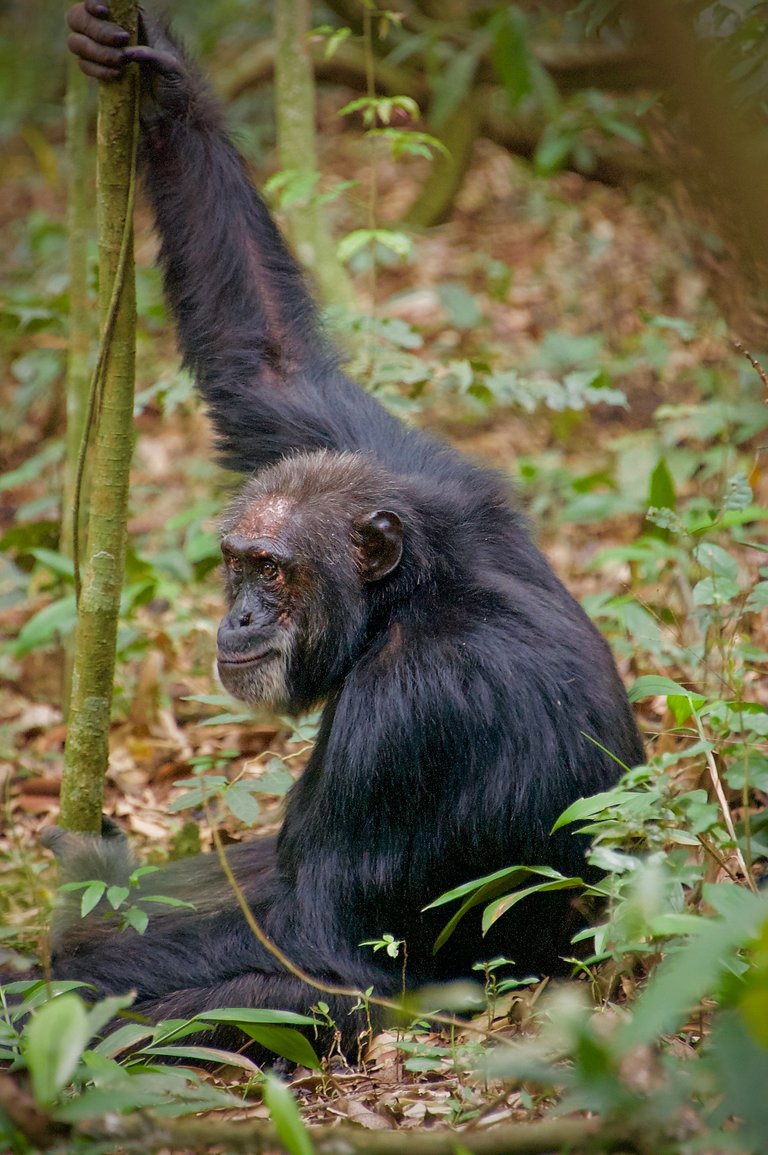What do you think happens when an old chimpanzee goes missing for months on end? It was a mystery until a few days ago. Greetings from the Ngogo Chimpanzee Project. Here’s a little research update from a doctoral student.
Reveal spoiler

Chimpanzees are social primates, they live in large communities. But, unlike primates that live in troops like baboons, chimpanzees have fission-fusion societies. This means the entire community may never be in one place, smaller parties constantly split off (fission) and come back together (fusion). Pictured above is part of a large party, kids, moms, adult males, and others all travel and socialize together.
As a researcher, this means that sometimes we won’t see a particular chimp for weeks. An individual might decide to go off on their own. As weeks turn into months, this can make us anxious. Are they okay? Sometimes, longer absences means a chimp is on consort, a male and female off together * nudge nudge wink wink. *
When I arrived this summer, an older male had gone missing. Bartok (45) hadn’t been seen for nearly two months. Then suddenly…
Reveal spoiler

Bartok is back!! This guy is former alpha, chimp royalty. Known for his political astuteness, Bartok's reign was considerable. These days, he hasn’t lost much swagger, but has a freckly bald forehead, white beard, and stiff fingers. His big return a few days ago was met with great excitement by the other chimps. Meanwhile, us researchers had to appear more reserved, but we're pretty excited too.
Thank's for reading, steemit! Looking forward to any comments and uploading more chimpanzee adventures.
Follow for more chimpy sciencey goodness @benfink.
100% of any steem earnings go directly to chimpanzee research and conservation
Today everything exists to end in a photograph
What do you mean @jodhpurindia? Is this a comment on the visuality of digital platforms or are you making comments just to get upvoted by bots? (flagged)
But sure, with the benefit of the doubt, I'd respond that chimps existence doesn't give a hoot about my photographs. And personally, I'm there to collect data. So a tweak, "Today everything exists to end up in a spreadsheet." In this case, there's at least a bit more truth here.
Good observation of the chimpanzees habitats, continue with your valuable research.
thanks @robertchr!
Upvoted and RESTEEMED :)
Wondering how Bartok got his name. And in an earlier post you mentioned Garbo and others. Is this apparent intersection of science and popular culture common? Do you think it has an impact on the way field workers see and understand the chimps?
No one person names the chimps, so there's an array of themes across the years. Many of the older males and females are named after Jazz musicians, and then other classic musicians and artists. There was a period of honoring powerful women. For instance, we have a chimpanzee named Doudna after the nobel prize winner. We haven't heard back from many celebrities on whether they in particular find this to be an honor.
Many other primate sites keep family named defined be a letter. For instance at Gombe where Jane Goodall started research, there is a famous F family. The matriarch, Flo, had offspring named Faben, Figan, Fifi, Flint, and Flame. Ostensibly, this makes it easier to remember names and recall their relationships. However, you might quickly see a problem here. Pretty soon, you've got to reach pretty far for a good name. If you have many families, you either repeat letters (confusing) or have tricky letters (imagine the chimps Xiaver, Xerxes, and Xabat). At Ngogo, there is no such naming rule. Although this can make a steeper learning curve at the beginning, it's ultimately liberating when naming our chimpanzees. I think we've selected some excellent names and perhaps the lack of a shortcut helps us focus in on the chimps as individuals. Read more on the F Family
Getting at your questions, there is a story that Jane Goodall met resistance when she wanted to give her chimps human names. Stodgy academics, the tale goes, bristled at this, because such naming implied the chimpanzees have individual attributes akin to humans and moreover, it could come in the way of objective science. Jane Goodall stubbornly kept to her schema, maintaining that the chimpanzees are in fact, individuals with unique personalities. Now, I've never heard verification of this story, but it's a good one, no? I agree with Dr. Jane, but in addition, I think that a researchers methods should always remove their own bias. Biased researchers are inevitable, but that doesn't mean biased results are. Good methods are designed to specifically counter potential bias.
Moreover, I think that as researchers get to know chimpanzees, their name origin becomes irrelevant. When I look at Jolie, I no longer think of the actress from the movies. When I see Struhsaker, I don't think of my old professor. I see the chimps since I've gotten to know them as individuals. We do this with people we know all the time when they share names with others. And the point is, chimps aren't so different.
Bartok looks as if he has some stories to tell...! Great pics and incredible background on these guys. Really fascinating to get insight into the Ngogo Chimp community. Thanks for sharing!
thanks @voronoi! There's a new documentary out about the Ngogo chimps that features Bartok. Check out Warrior Apes, available on Amazon